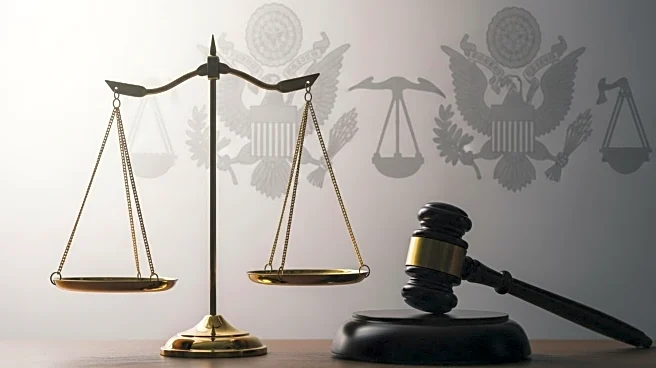What is the story about?
What's Happening?
The Defense Department is preparing to authorize up to 600 military attorneys to serve as temporary immigration judges, responding to a request from the Justice Department. This initiative aims to address the backlog of over 3.4 million immigration cases. The Trump administration has loosened job requirements for temporary immigration judges, allowing a broader range of government lawyers to preside over cases. This move follows the firing of more than two dozen immigration judges nationwide. The plan involves training Judge Advocate General Corps officers in immigration law, procedure, and policy, with the Justice Department covering the costs.
Why It's Important?
The deployment of military attorneys as immigration judges is a significant development in the U.S. immigration system, which is currently overwhelmed by a substantial backlog of cases. This initiative could expedite case processing, potentially reducing wait times for individuals seeking immigration decisions. However, it raises concerns about the adequacy of training and the ability of military attorneys to handle complex immigration law. Critics argue that this approach may undermine due process and the integrity of the immigration court system, highlighting the need for experienced judges in making life-altering decisions.
What's Next?
The Justice Department plans to train the selected military attorneys over six weeks, culminating in a written exam to qualify them as immigration judges. The initiative may face scrutiny from legal experts and immigration advocacy groups, who could challenge the adequacy of training and the potential impact on case outcomes. Congress may be urged to exercise oversight to ensure the rule of law and protect the independence of the immigration judiciary. The effectiveness of this approach will be closely monitored, with potential adjustments based on feedback and results.
Beyond the Headlines
This development reflects broader challenges within the U.S. immigration system, including resource constraints and policy shifts under the Trump administration. The use of military personnel in civilian judicial roles raises ethical and legal questions about the separation of military and civilian functions. It also underscores the ongoing debate over immigration policy and the balance between efficiency and fairness in judicial processes. The initiative may set a precedent for future collaborations between military and civilian agencies in addressing systemic challenges.















